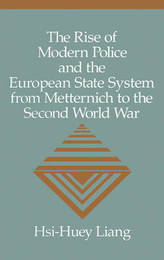
|
The Rise of Modern Police and the European State System from Metternich to the Second World War
Hardback
Main Details
| Title |
The Rise of Modern Police and the European State System from Metternich to the Second World War
|
| Authors and Contributors |
By (author) Hsi-Huey Liang
|
| Physical Properties |
| Format:Hardback | | Pages:362 | | Dimensions(mm): Height 237,Width 162 |
|
| Category/Genre | World history - from c 1900 to now |
|---|
| ISBN/Barcode |
9780521430227
|
| Classifications | Dewey:363.2094 |
|---|
| Audience | | Professional & Vocational | |
|---|
|
Publishing Details |
| Publisher |
Cambridge University Press
|
| Imprint |
Cambridge University Press
|
| Publication Date |
27 November 1992 |
| Publication Country |
United Kingdom
|
Description
The Rise of the Modern Police and the European State System from Metternich to the Second World War re-examines the diplomatic history of Europe from the 1820s to World War II as a succession of mounting police problems linking the countries of the Continent through their growing dependency on one another for domestic order, security, and social progress. It culminates in the clash between movement toward international police collaboration and the alternative of Continental police hegemony by one power, as attempted by Nazi Germany between the late 1930s and 1945. This book is the first comprehensive history of Continental police systems, especially in the context of political and diplomatic history.
Reviews"He has roamed through mountains of sources and a careful reading of his detailed list of archival files is in itself an education in the history of the European police." German Studies Review "Liang's research efforts are impressive. He has mined important archival sources exhaustively to weave a skillful narrative." The Historian "...a must not only for students of the police, but also for social and political historians looking for bridges between these fields." George C. Browder, Central European History "This admirably researched, cogently developed, and broadly focused study deserves the attention of all historians of nineteenth- and twentieth-century Europe." Jonathan W. Daly, Journal of Modern History
|